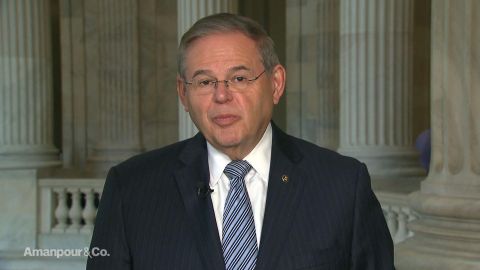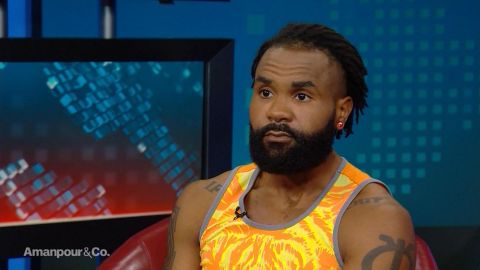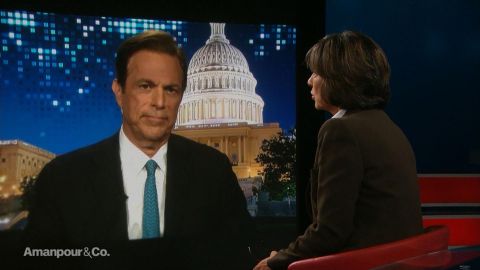Read Transcript EXPAND
MICHEL MARTIN: RJ, let me just set the table. You’re living in Tulsa, Oklahoma. You meet this young lady. You’re intrigued by her. You want to get to know her better and by extension her family. And you find out that they are very — at least your dad, is very interested in guns. When did you realize that guns are really important to this man?
RJ YOUNG, AUTHOR, LET IT BANG: We were sitting alone in his living room in recliners and he kept a bag with a firearm in it. And he went everywhere with this bag that had a firearm in it. And I just came out with it, something I probably wouldn’t have done knowing what I know about gun culture now. And I said why do you — why that gun and what is special about it? And he talked for an hour. He just went into revolvers and semi-automatics and all these things that I really didn’t have a language to understand at the time, but it was clear this was very important. And this was the thing that I decided was going [13:45:00] to link us. We were going to come to understand each other if we could. But that would mean that I needed to do a lot of work, work that I didn’t know I was so unprepared to do.
MARTIN: What was your family’s relationship with guns growing up? What did they think about guns?
YOUNG: My relationship with guns was movies and music. My parents never kept guns in the house. Though they’re both retired military Air Force. My mother was an officer Captain, my father was Buck Sergeant but we didn’t have guns in the house, didn’t think it was that big a deal.
MARTIN: And you decided not only to learn how to shoot, you decided to learn a lot about guns. Tell me about that.
YOUNG: When I decide to learn a lot, I decided to keep going. There were questions that were raised by myself. There were assertions that were put forth to me by other people that I wanted to sass out and put to bed for myself. One of which was, is a good guy with a gun really that am I safer with a gun as those who walk around with concealed carry weapons tend to say or folks who keep weapons in their homes, firearms in their homes for the purpose of self-defense? What is it that they believe and is what they believe correct and should I believe it?
MARTIN: So you obviously went pretty deep and you also got a concealed carry permit and got yourself trained as an instructor. I think that that shows a lot of commitment. What did you come to see about the experience of shooting?
YOUNG: For me or for —
MARTIN: For the people that you met or for the people you talk to or for you.
YOUNG: Well, for most people, it’s empowering, you know. You are at the end of something that can take a life. You’re at the end of something that’s very very powerful and it’s all up to you. Yes, it’s tremendously empowering which, you know, is dangerous from where I’m sitting because I don’t believe most people understand the responsibility of that power, even the folks who think they do.
MARTIN: Charles, your father-in-law, brought you into his world. I mean he took you to gun shows with him. I mean he — I think he helped you pick your first gun, initially tried to teach you to shoot it. You weren’t very good at it at first. But you quickly realize that the experience that he’s having with his guns is very different than the experience you’re going to have as a gun owner. I mean did you ever talk to him about that? Did you ever get to say him, “Hey, Charles? You know, me with a gun in my truck is kind of different than you with a gun in yours”? Did you ever get to have a conversation with him?
YOUNG: Often, often. It would come up. We were driving together and we would have a gun in the truck. It would also come up when he watched Gunsmoke and I would ask, you know, where are the black folks? Where are the minorities?” Over time, little conversations became larger conversations. The news would be helpful because Charles watches a lot of news and I watch it with him. I’m still seeing his daughter when Trayvon Martin is shot. You know, I can list off pressure from Tulsa, shot with his hands in the air. He get to see and he get to see me.
MARTIN: You talk a lot about race in this book. I mean it’s in the title, right? This is a black man’s journey and your race is very fundamental to the experience that you had. I mean how could it not be. You’ve made a powerful case in your book that for some people, this commitment to guns is really tied up in racial grievance and a sense of fear. What I think a lot of people would call an irrational fear. But with this family, they loved you like a son and they still love their guns. I’m just wondering how you understand it.
YOUNG: I think how I understand it for them is I’m not going to tell Charles who believed this and I think still believes this. It is not get to protect his family in the best way he thinks he can. And I’m not going to tell anybody, Charles or otherwise, that that’s not a good reason to have guns. And that’s one way of making peace with it.
MARTIN: You’ve made a point in your book. Let me talk about that, that African-American women in particular and African-Americans were broadly are showing a greater interest in firearms. Why is that? Why in your experience is that?
YOUNG: Fear. Fear. Black women, black men are more afraid say than they were three years ago. Because they are being accosted more often with hate speech, with rhetoric that puts them in a state of fear. And when we are afraid, we usually take steps to make sure that we no longer feel afraid. And for many black folks that means I need a gun, [13:50:00] and I need to keep it close, and I need to know how to use it. Because there are people who will feel empowered to tell me I don’t live in their country anymore.
MARTIN: I’m going to read a passage from your book. If I’ve learned anything during my odyssey into guns and their role in our country is that we are in a literal arms race, ramped up by the radicalized fear peddle to us by damn near every institutionalized force in the land. Gun culture in America is inherently racist because white people historically fear black men with guns. I cited fact, history, story, and policy to prove this point. And yet I live as a black man in a country where too many people are so afraid of being called racist, they won’t confront their own racism around guns, around their social economic or constitutional privilege. You’ve trained yourself. You’ve learned to shoot. You have guns yourself. And you say yet now you are still afraid. In fact, more afraid. Why?
YOUNG: Well, the more I learned, the more I know, the more I don’t believe other people do. I don’t feel better knowing that there are more people with guns who don’t practice. You know, I had to go look that up. I had to go find that knowledge. I don’t feel better knowing that the response to hatred is to prepare for violence. So when I say a little arms race, more black people are buying guns, more white people have been buying guns. I was told at my NRA instructor certification that I was teaching them to shoot back.
MARTIN: Them?
YOUNG: Them. Now, I didn’t go as far as to ask them. I’m still dumbfounded by that comment but I assumed them was black people being me. So yes, I’m afraid. I’m afraid to go outside. I’m afraid to get pulled over. I’m afraid to walk in my own city sometimes.
MARTIN: And where does this end up, RJ? I mean where — you say that we are in a literal arms race and not with some foreign power. We’re in a literal arms race with ourselves is what I hear you saying. Where does this end up?
YOUNG: Hopefully, with conversations like this, black, black, it’s really hard to have this conversation if I have a gun on my waist and you have a gun on yours. There’s no talking in the way that we need to talk if you’re afraid the person across you is going to hurt you.
MARTIN: Well, some argue — at least the argument of the people who believe in expansive gun ownership, let’s put it that way, their argument is the opposite. It actually makes it more essential that we talk because now we’re all equal. What do you say to that?
YOUNG: I say I’m a black man who has been targeted more often than many white folks are targeted. And I would say that my experience and my story would say that’s not true. Now, do I have a fact to point that out? No. But I also have fear and what I’ve chosen to do with my fear is to continue to stand in it, is to lean in, is to walk around in my Jordans and my beads and my hair and believe that people will see me when I speak to them and say, “Hey. That’s RJ,” and not, “That’s a black man who’s going to try to hurt me.” Or vice versa. “See, my buddy Jason, and not a six foot five, 300-pound white guy who’s going to try to hurt me,” that people will stand in there for just a little bit longer, ask a vulnerable question, and hopefully get to know a person.
MARTIN: To that end though, and spoiler alert, your relationship with Lizzie and with her family by extension, it ended. And what does it say that you are in this deeply intimate relationship with this woman whom you evidently love deeply and who loved you and whose family loved you and embraced you but somehow you couldn’t make it work? Do you have hope that this divide that we are now living in can be bridged at some point?
YOUNG: Yes. Yes.
MARTIN: Because?
YOUNG: I was in an interracial marriage. Nobody died. You know we didn’t — we don’t want to hurt each other. The hurt was not something we attempted to do. It happened and it will happen again for someone else if it’s not happening already. But I have a hope because people who don’t look alike fall in love. It’s a thing that they do. People who don’t look alike become friends forever. That’s what we do. And I believe that when push comes to shove, those friends will matter more than the guns they have, the violence they can perpetrate. And you hear those stories about a lot — I know I hear those stories a lot about how folks would say, “No, that’s not a black person. That’s not a white person. That’s John. That’s Jenny.” And sometimes if that rears up and you have to be in an uncomfortable spot and you have to make a decision. And that is the part that I’m not sure about my country.
MARTIN: RJ Young, thanks so much for talking with us.
YOUNG: Thank you, Michel.
About This Episode EXPAND
Christiane Amanpour speaks with presidential historian Michael Beschloss and Senator Bob Menendez (D-N.J.). Michel Martin speaks with author R.J. Young.
LEARN MORE


